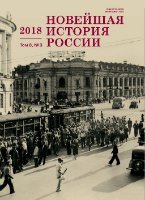Государственный заказ на пьесы и его негативные последствия в Ленинграде в 1953–1964 годы (по материалам Управления культуры Ленгорисполкома)
Government Order of Plays and its Negativity in the Leningrad 1953–1964
Author(s): Yu. ZhuangSubject(s): Politics, Theatre, Dance, Performing Arts, Post-War period (1950 - 1989)
Published by: Издательство Исторического факультета СПбГУ
Keywords: politics; government order; Leningrad; dramatic theater; playwrights; a contradiction;
Summary/Abstract: This article aims to show the politic “government order of plays” and its negativity in the Leningrad’s dramatic theaters. It has become a generally accepted view that the theater was one of the most important platforms to educate citizens during the period of the Soviet Union. Therefore, the apparatus of CPSU and the state authorities strictly took the censorship in the theater, especially in ideology. In the period from 1953 to 1964, the apparatus of the party was responsible for making and confirming the policy of socialist culture, while the state authorities claimed responsibility for enforcing the cultural policy of the party. It means taking administrative interference in the theatrical works to be avoided from the ideological mistakes. Analysis of the archival documents, which preserved in the Central state archive of literature and art of Saint Petersburg, reveals one of the prominent consequence of “government order of plays” is the contradiction between theaters and playwrights. The contradictions were shown particularly in Leningrad. In the middle of the 1950s, the soviet critics in the first place began to reflect on the current interventions in theaters. In the end, they concluded that the government order greatly reduced creative activity in the theatres and led to the backwardness of Soviet dramatic art. Therefore, as the cultural policy had changed in the 1950s, the state authorities reduced the administrative leadership in the theaters. The present research shows that at the end of the 1950s, the soviet theater had gained more creative freedom, compared to the previous Stalin’s time.
Journal: Новейшая история России
- Issue Year: 8/2018
- Issue No: 24
- Page Range: 754-760
- Page Count: 7
- Language: Russian

